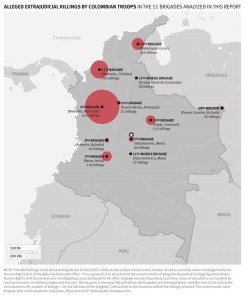By: Patrick Foley
Human Rights Watch has said in a report released June 24th, titled “On Their Watch” that there is substantial evidence suggesting that high-ranking army officers in Colombia knew of the extrajudicial killings of hundreds of civilians between 2002 and 2008. The report claims that generals and colonels knew about “false positive” killings and may have ordered troops to kill civilians and report them as combat fatalities in the war against armed guerrilla groups.
A Human Rights Watch analysis of data from the Office of the Attorney General shows that international and Colombian prosecutors have identified more than 180 battalions and other tactical units, attached to virtually all brigades and in every army division, that have allegedly committed extrajudicial killings between 2002 and 2008. Evidence detailed in the report shows that commanders of these brigades at least knew or should have known about the false positive killings, which would make the leaders criminally liable as a matter of command responsibility. Even though informers for this kind of crime have faced unceasing death threats, Human Rights Watch has obtained recordings and transcripts of testimony to prosecutors from military personnel implicated in false positives who reported that their superiors, including generals and colonels, allegedly knew of, planned, ordered, or otherwise facilitated the crimes.
Roughly 800 members of the Colombian military have been jailed for killing civilians, but the vast majority of these cases have never and will never come before a court. One of the biggest obstacles that prosecutors will face in this ongoing investigation is the constitutional amendment that Colombia passed in 2012, called the Legal Framework for Peace. This amendment paves the way for impunity for atrocities by guerrilla groups, paramilitaries, and the Colombian military if a peace agreement is reached with the Revolutionary Armed Forces of Colombia (FARC) guerrillas. The amendment empowers Congress to limit the scope of prosecutions for atrocities to the individuals found “most responsible”, providing virtual immunity to anyone else involved; to exempt war crimes from criminal investigation if they are not determined to have been systematic; and to apply “alternative penalties” to all those convicted, including those individuals deemed most responsible.
What the Colombian military and its officials stand accused of is abhorrent, and the civilians of Colombia must see the individuals responsible for the killings brought to justice if there is ever to be trust between the people and the government. However, it is important to note that these war-crimes are not really that surprising. When a government or a group or a population becomes focused on killing enemies, and the success of their operations is judged by the number of enemies killed and the efficiency of the killing, then the goal of the operation becomes killing the opposition instead of securing land or protecting a population or reducing the threat of an enemy force. When a military operation is deemed a bigger success the bigger the body count the kind of atrocity going on in Colombia becomes a war crime for which military officers are rewarded. This standard is used by many other transnational forces and nations around the world including the United States. As long as this is the standard for judging the success of military operations, how can anyone be surprised by the actions of the Colombian military? Anyone killing civilians in a violent conflict should be tried for it, but the only way to avoid this kind of tragedy in the future is to re-examine the conversation around why governments use violence and exactly what they see it accomplishing.

